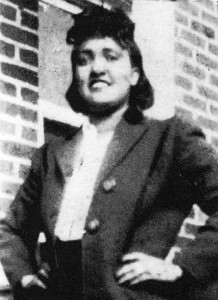Black History Month: Henrietta Lacks
Wednesday, February 1st, 2023

Henrietta Lacks’ cancer cells, called HeLa, are used around the world for medical experiments.
Credit: © Pictorial Press Ltd, Alamy Images
February is Black History Month, an annual observance of the achievements and culture of Black Americans. This month, Behind the Headlines will feature Black pioneers in a variety of areas.
A mother and a medical marvel with a lasting legacy, Henrietta Lacks has saved nearly 10 million lives. Lacks was an African American woman born in Roanoke, Virginia, on August 1, 1920. Lacks unknowingly became a donor of a line of cells widely used in medical research. Those cells, known as HeLa cells, became one of the most important advances in medical science. HeLa stands for Henrietta Lacks. Lacks only lived 31 years, but her cells are still alive today.
Lacks was born Loretta Pleasant. She later changed her name to Henrietta and married David Lacks in 1941. The couple moved to Baltimore, Maryland, in the 1940’s. In 1951, she was diagnosed with cervical cancer at the Johns Hopkins Hospital. She died on October 4 of that year, leaving behind her five children. Before her death, doctors removed a sample of cancer cells during a medical examination. The sample was taken without her knowledge.
Scientists at Johns Hopkins University used the sample to establish the HeLa cell culture. A cell culture is a population of cells grown under controlled conditions for research. The usefulness of cell cultures is often limited because the cells die after a certain number of divisions. However, the HeLa cells divided indefinitely without dying.
HeLa cells grow faster than other cell cultures. They survive shipment by mail, enabling them to be sent to laboratories around the world. The unique qualities of HeLa cells led to many scientific discoveries and a greater understanding of biological processes. One of the first uses of HeLa cells was to test the safety and effectiveness of a vaccine for the disease polio. HeLa cells have also contributed to treatments for Parkinson’s, HIV, and AIDS, as well as vaccines for the flu, HPV, and COVID-19. Her cells have been used in nearly 75,000 studies.
The World Health Organization honored Henrietta Lacks in 2021. The city of Roanoke, Virginia, is replacing a statue of confederate general Robert E. Lee with a bronze statue of Lacks. Nearly 72 years after her death, Lacks will be memorialized in her hometown for years to come. Author Rebecca Skloot wrote about Henrietta’s life and her medical contribution in The Immortal Life of Henrietta Lacks released in 2010. The story was adapted into a movie in 2017 starring Oprah Winfrey.
HeLa cells were also used to produce the first cellular clones. Cellular clones are a group of cells descended from a single cell. They are genetically identical, enabling scientists to study entire populations of cells with a particular genetic trait.
HeLa cells remain an essential tool in laboratories throughout the world. They have been used to develop drugs and other therapies worth billions of dollars. However, Henrietta Lacks and her family received no compensation for the use of her cells. In medical ethics, her case is often cited as a classic example of failure to obtain informed consent from a tissue donor. Informed consent means that participants fully understand and accept the known risks and possible benefits of a medical procedure. Today, researchers regularly obtain consent from patients before taking tissue samples.
In 2013, the United States National Institutes of Health (NIH), a government agency that conducts and supports a broad range of biomedical research, made a historic agreement with the surviving family of Henrietta Lacks. NIH researchers must now obtain permission from a special review panel before they can view and use detailed genetic information of HeLa cells. Members of the Lacks family are included on the review panel. NIH also requested that researchers studying HeLa cells include an acknowledgment to the Lacks family when the research is published.



